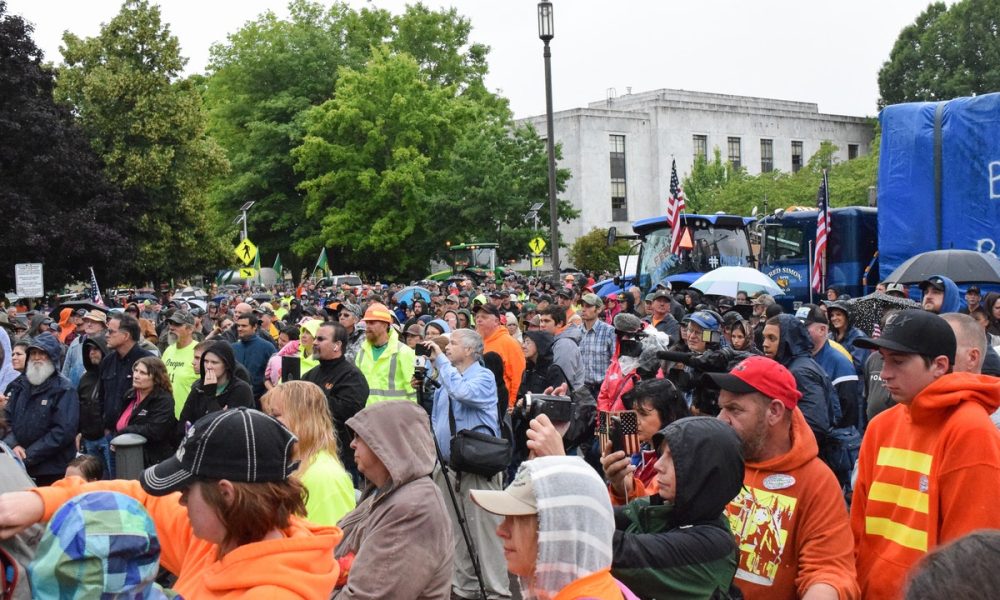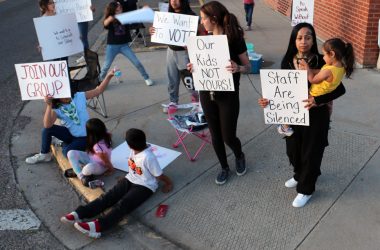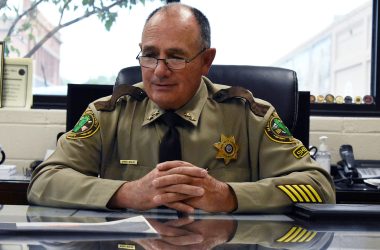
Timber Unity supporters and other opponents rally against House Bill 2020 on June 27. (Saphara Harrell/Salem Reporter)
SALEM — Two members of a quickly rising political activist community of Oregon loggers have been invited to the White House to attend a speech on “America’s environmental leadership” on Monday, July 8, by President Donald Trump.
Timber Unity, a group comprised mostly of loggers but also truckers, farmers and other Oregonians opposed to a carbon-regulating program proposed by Oregon lawmakers, posted the invitation on their Facebook page Tuesday night.
As of Wednesday afternoon, the post had been shared more than 3,000 times and received more than 1,000 comments.
A White House official confirmed the invitation to the Oregon Capital Bureau Wednesday.
[ KEEP YOUR LOCAL NEWS STRONG – SUBSCRIBE ]
Timber Unity organizers Marie Bowers, a farmer from Coburg, and Todd Stoffel, a log truck driver from Washougal, Wash., will be representing the group at Monday’s event. Stoffel grew up in Monroe, and half the business of his company, GT Stoffel Trucking, is in Oregon, he said.
Stoffel said he didn’t know what the event would entail, or who else would be there, but he’s looking forward to the trip.
“We have an opportunity to let the voice of rural America to be heard,” Stoffel said.
The Timber Unity Facebook page created its first post June 21, and already has more than 47,000 members.
Those behind the group were chief organizers of a large rally at the Capitol last Thursday, June 27, protesting House Bill 2020, which would have capped the state’s greenhouse gas emissions.
Bowers said she got word from a political friend during the rally that the White House was watching what was happening in Oregon. She announced it to the crowd, which erupted with applause.
Bowers said the White House reached out to Nick Smith, executive director for Healthy Forests, Healthy Communities, a logging-friendly nonprofit that started in Roseburg, during the rally. The White House asked Smith who from Oregon should attend the event, and he said Timber Unity, Bowers said.
Bowers was told of the invitation after the rally, and got the official invitation Tuesday.
The cap and trade proposal, which prompted Senate Republicans to avoid the Senate for nine days in protest late last month to prevent a vote on it, died at the end of the legislative session.
Stoffel said many have been surprised at how Timber Unity took off, but he said there are parallels to the national uprising of rural, working-class Americans who have become more vocal since Trump took office.
“A couple guys had an idea and they created a Facebook page. It’s been word of mouth from there,” Stoffel said. “This is a voice for rural Oregon, rural America, that we’re tired of being steamrolled, which is what a lot of the policies seem to do for us. The stuff that’s passed is about the big cities, especially in Oregon. There are other parts of the state of Oregon other than just Portland.”
The Timber Unity movement casts itself as purely grassroots, according to several Republican lawmakers and protesters.
However, they are in part financed by Stimson Lumber CEO Andrew Miller, a frequent GOP donor who is prominent on the Timber Unity Facebook page and has a letter explaining his $5,000 seed donation on their website.
Stoffel said he didn’t know what their current funding level is. Its political action committee shows $31,457, according to state campaign finance records.
A GoFundMe campaign that popped up when the group was getting organized received money from several sympathetic business partners, though the group has moved to a direct funding channel on their website.
Stoffel said Timber Unity shut down the GoFundMe as organizers learned it didn’t comply with state requirements to report political spending and contributions.
Timber Unity’s website shows its organizers as three truckers: Jeff Leavy, Adam Lardy and Scott Hileman.
The White House invitation is the apparent culmination of several weeks of national attention on the Republican walkout, which was picked up by outlets from the New York Times to Vice to Fox News.
At least one environmental advocate worried it could “deepen” divides between parties on the issue of how to tackle climate change.
“Growing up here, there was not this strong, partisan us-versus-them divide,” said Meredith Connolly, Oregon director for Climate Solutions, which was a strong supporter of cap and trade. “And I think adopting this mantle of Trump’s White House and his agenda, I fear, will deepen those divides here in Oregon, and I want us to be moving forward toward solutions that work for all of Oregon. And I think the more this is influenced by Donald Trump’s divisiveness, I worry this will take us in the wrong direction.”
Stoffel said issue is rural versus urban, Republican versus Democrat.
He said Democrats at the Legislature “snubbed their noses” at loggers and truckers who wanted to understand the bill. Republicans embraced them, he said.
But it was Senate President Peter Courtney, D-Salem, who ended the walkout and standoff over cap-and-trade by announcing that his own caucus didn’t have the votes to pass the bill.
“The rural parts of this country have been ignored for years,” Stoffel said, adding Trump’s election proves that. “The majority of Americans are tired of the same old, same old.”
Stoffel said he understands the majority of voters put Democrats who ran on cap-and-trade in office, but said that’s because rural voters have routinely been pushed down. They stay home because they know they will be “steamrolled” by the Democratic agenda, he said.
Democrats and environmentalists pushing climate legislation said House Bill 2020 was tailored to protect rural Oregon, driving dollars from the cities to projects in rural communities.
Stoffel said that could be true, and many might be misunderstanding the bill, but if so, that’s on Democratic lawmakers for not taking the time to clearly explain it.
“If you read the bill and you read all the legal jargon, the normal person cannot figure out what they are saying,” he said. “When we were in the House and Senate chambers, they read so fast and push everything so fast, that you can’t understand what’s going on.”
“Sadly, we know that the climate crisis is harming people in rural Oregon,” said Brad Reed, a spokesman for Renew Oregon, a leading advocate of the cap and trade policy. “They’re among the hardest hit by drought, wildfire and tree disease, fishery collapse. And it’s not just inaction. The White House is actively working to make the problem worse.”
Stoffel said the invitation shows rural voices in Oregon and other states across the country are being heard. He said it could add momentum to Timber Unity’s already skyrocketing profile, and he might even get a chance to talk policy with the president.
Stoffel said some in Timber Unity have been hurt by Trump’s trade war with China, resulting in higher tariffs.
“There is not a perfect one-size fits all policy with any administration,” he said. “Yes, there are some that have hurt our industry. I may have an opportunity to bring that up with him.”
Reporter Aubrey Wieber: [email protected] or 503-575-1251. Reporter Claire Withycombe: [email protected] or 971-304-4148.
SUBSCRIBE TO HELP PRODUCE VITAL REPORTING — Help us grow and get better with your subscription to our digital news service – $5 a month. Sign up HERE.




